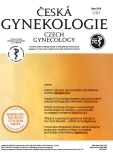Opakovaná děložní intrapartální ruptura po endoskopické operaci hluboké endometriózy rektovaginálního septa a močového měchýře
Autoři:
J. Vystavěl 1; J. B. Eim 2; R. Pilka 3
Vyšlo v časopise:
Ceska Gynekol 2018; 83(5): 354-358
Kategorie:
Kazuistika
Souhrn
Cíl práce:
Popis případu pacientky s anamnézou opakovaných endoskopických resekčních operací hluboké infiltrující endometriózy (DIE) a jejich význam pro rozvoj závažných rizik při následujícím porodu.
Typ práce: Kazuistika.
Název a sídlo pracoviště:
Gynekologicko-porodnické oddělení Nemocnice Prostějov, Středomoravská nemocniční a.s.; Gynekologicko-porodnické oddělení, Nemocnice Vyškov p.o.; Ústav patologie, Fakultní nemocnice Brno, Lékařská fakulta, Masarykova Univerzita, Brno; Porodnicko-gynekologická klinika, Fakultní nemocnice Olomouc, Lékařská fakulta, Univerzita Palackého Olomouc.
Metodika a výsledky:
Prezentujeme případ 29leté pacientky s opakovanými laparoskopickými operacemi pro DIE. Zároveň jsou tím přinášena nová rizika pro samotný porodní děj ve smyslu závažných poranění závěsného aparátu dělohy, pochvy, parametrií s rizikem rozvoje život ohrožujícího krvácení. Námi prezentovaný případ dokumentuje výskyt nových rizik a komplikací pro následná těhotenství u takto operovaných žen. Závěr: Tento případ demonstruje, že nárůst radikality při chirurgickém řešení hluboké endometriózy může přinášet dosud nepopsaná rizika pro následné těhotenství a porod.
Klíčová slova:
hluboká infiltrující endometrióza, DIE, intrapartální ruptura dělohy, život ohrožující peripartální krvácení, laparoskopie
Zdroje
1. Bernardi, TS., Radosa, MP., Weisheit, A., et al. Laparoscopic myomectomy: a 6-year follow-up single-center cohort analysis of fertility and obstetric outcome measures. Arch Gynecol Obstet, 2014, 290(1), p. 87–91.
2. Borghese, B., Sibiude, J., Santulli, P., et al. Low birth weight is strongly associated with the risk of deep infiltrating endometriosis: results of a 743 case-control study. PLoS One, 2015, 10(2), p. e0117387.
3. Darai, E., Cohen, J., Ballester, M. Colorectal endometriosis and fertility. Eur J Obstet Gynecol Reprod Biol, 2017, 209, p. 86–94.
4. Delepine, O., Curinier, S., Agar, N., et al. [About a case of uterine per-partum rupture, 37months after resection of a rectovaginal endometriosis nodule]. J Gynecol Obstet Biol Reprod (Paris), 2016, 45(8), p. 985–989.
5. Donnez, J., Squifflet, J. Complications, pregnancy and recurrence in a prospective series of 500 patients operated on by the shaving technique for deep rectovaginal endometriotic nodules. Hum Reprod, 2010, 25(8), p. 1949–1958.
6. Eskenazi, B., Warner, ML. Epidemiology of endometriosis. Obstet Gynecol Clin North Am, 1997, 24(2), p. 235–258.
7. Fedele, L., Bianchi, S., Zanconato, G., et al. Long-term follow-up after conservative surgery for rectovaginal endometriosis. Am J Obstet Gynecol, 2004, 190(4), p. 1020–1024.
8. Fedele, L., Bianchi, S., Zanconato, G., et al. Gonadotropin-releasing hormone agonist treatment for endometriosis of the rectovaginal septum. Am J Obstet Gynecol, 2000, 183(6), p. 1462–1467.
9. Granese, R. Acute abdomen in pregnancy with endometriosis. Acta Obstet Gynecol Scand, 2010, 89(6), p. 844–845.
10. Hesselman, S., Hogberg, U., Ekholm-Selling, K., et al. The risk of uterine rupture is not increased with single- compared with double-layer closure: a Swedish cohort study. BJOG, 2015, 122(11), p. 1535–1541.
11. Chapron, C., Fauconnier, A., Dubuisson, JB., et al. Deep infiltrating endometriosis: relation between severity of dysmenorrhoea and extent of disease. Hum Reprod, 2003, 18(4), p. 760–766.
12. Itoga, T., Matsumoto, T., Takeuchi, H., et al. Fibrosis and smooth muscle metaplasia in rectovaginal endometriosis. Pathol Int, 2003, 53(6), p. 371–375.
13. Jacques, M., Freour, T., Barriere, P., et al. Adverse pregnancy and neo-natal outcomes after assisted reproductive treatment in patients with pelvic endometriosis: a case-control study. Reprod Biomed Online, 2016, 32(6), p. 626–634.
14. Jenkins, S., Olive, DL., Haney, AF. Endometriosis: pathogenetic implications of the anatomic distribution. Obstet Gynecol, 1986, 67(3), p. 335–338.
15. Kim, MS., Uhm, YK., Kim, JY., et al. Obstetric outcomes after uterine myomectomy: Laparoscopic versus laparotomic approach. Obstet Gynecol Sci, 2013, 56(6), p. 375–381.
16. Koh, CH., Janik, GM. The surgical management of deep rectovaginal endometriosis. Curr Opin Obstet Gynecol, 2002, 14(4), p. 357–364.
17. Koninckx, PR., Meuleman, C., Demeyere, S., et al. Suggestive evidence that pelvic endometriosis is a progressive disease, whereas deeply infiltrating endometriosis is associated with pelvic pain. Fertil Steril, 1991, 55(4), p. 759–765.
18. Moen, MH., Muus, KM. Endometriosis in pregnant and non-pregnant women at tubal sterilization. Hum Reprod, 1991, 6(5), p. 699–702.
19. Parker, WH., Einarsson, J., Istre, O., et al. Risk factors for uterine rupture after laparoscopic myomectomy. J Minim Invasive Gynecol, 2010, 17(5), p. 551–554.
20. Sahu, L., Rani, R. Comparison of scarred and unscarred uterine ruptures. Int J Gynaecol Obstet, 2008, 101(1), p. 77–78.
21. Setubal, A., Sidiropoulou, Z., Torgal, M., et al. Bowel complications of deep endometriosis during pregnancy or in vitro fertilization. Fertil Steril, 2014, 101(2), p. 442–446.
22. Sparic, R., Hudelist, G., Keckstein, J. Diagnosis and treatment of deep infiltrating endometriosis with bowel involvement: a case report. Srp Arh Celok Lek, 2011, 139(7–8), p. 531–535.
23. Van De Putte, I., Campo, R., Gordts, S., et al. Uterine rupture following laparoscopic resection of rectovaginal endometriosis: a new risk factor? Br J Obstet Gynaecol, 1999, 106(6), p. 608–609.
24. Vercellini, P., Crosignani, PG., Somigliana, E., et al. Medical treatment for rectovaginal endometriosis: what is the evidence? Hum Reprod, 2009, 24(10), p. 2504–2514.
25. Vigano, P., Corti, L., Berlanda, N. Beyond infertility: obstetrical and postpartum complications associated with endometriosis and adenomyosis. Fertil Steril, 2015, 104(4), p. 802–812.
26. Villa, G., Mabrouk, M., Guerrini, M., et al. Uterine rupture in a primigravida with adenomyosis recently subjected to laparoscopic resection of rectovaginal endometriosis: case report. J Minim Invasive Gynecol, 2008, 15(3), p. 360–361.
27. Wu, X., Jiang, W., Xu, H., et al. Characteristics of uterine rupture after laparoscopic surgery of the uterus: clinical analysis of 10 cases and literature review. J Int Med Res, 2018, p. 300060518776769.
28. Xiaoxia, B., Zhengping, W., Xiaofu, Y. [Clinical study on 67 cases with uterine rupture]. Zhonghua Fu Chan Ke Za Zhi, 2014, 49(5), p. 331–335.
Štítky
Dětská gynekologie Gynekologie a porodnictví Reprodukční medicínaČlánek vyšel v časopise
Česká gynekologie

2018 Číslo 5
Nejčtenější v tomto čísle
- Hladina hCG po embryotransferu jako prognostický ukazatel fyziologického těhotenství
- Vaginální mikrobiom
- Faktory ovlivňující sérovou hladinu anti-Müllerian hormonu
- Pánevní aktinomykóza a IUD
